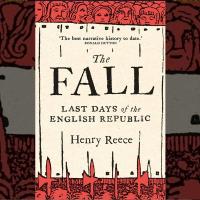Henry Reece’s The Fall: Last Days of the English Republic has a simple premise: to provide a narrative account of the last eighteen months of the English republic, from the death of Oliver Cromwell in September 1658 to the restoration of the monarchy in May 1660. A straightforward aim perhaps, but achieving it is somewhat more complicated. The days between the accession of Richard Cromwell and the return of the king are some of the most convoluted, confused, and chaotic in the entirety of British history. As Reece states, 'They were ... overflowing with dramatic events: at least three parliaments manhandled by military force; rival armies of Englishmen facing each other across the Scottish border; General Monck’s triumphal march south; the reversal of Pride’s Purge as the Long Parliament returned; and then the final dissolution of the Long Parliament after twenty years.' They are a swamp of rumour, faction, and misdirection, in which it is easy for even the most experienced explorer to sink with no trace. Reece quite rightly notes in his Introduction that very little space has ever been dedicated to this exceptionally important period, and this is the reason: it is nigh-on impossible to navigate through it, let alone write a coherent narrative about it.
They are a swamp of rumour, faction, and misdirection, in which it is easy for even the most experienced explorer to sink with no trace. Reece quite rightly notes in his Introduction that very little space has ever been dedicated to this exceptionally important period, and this is the reason: it is nigh-on impossible to navigate through it, let alone write a coherent narrative about it.
Luckily for the reading public, Reece is not one to be dissuaded from a task purely because success is unlikely. Instead, he has pulled on his wellies, squared his shoulders, and marched with intent into the quagmire that is 1658 to 1660. He has discovered islands of sure ground, aided by years of experience, and by using those firm foundations he has built footpaths that anyone – including those unfamiliar with the period – can follow. Along the way, he has put up signposts, information boards, lights and strings of bunting, not just to illuminate the path but to make it an enjoyable, colourful, and pleasant journey. And he has emerged on the other side absolutely gleaming.
Perhaps one reason for his success is that Reece has started on the correct side of the bog. Instead of working his way backwards from the Restoration, assuming a safe path to be inevitable, he has entered with the belief that the return of the Stuarts was not an assured outcome of Oliver’s death. As Reece has stated, there were, indeed, many viable options open for the political nation. If certain players had made different decisions at different stages, if some had been a bit more adroit or a bit more circumspect, then the route to Restoration would have been much longer – or never have existed at all. Hindsight, so they say, is 20/20, but historians can sometimes fall into the habit of using blinkers regardless, and it would help us all to remember that. In removing the certainty of Charles II, Reece has mapped out the landscape in a much more valuable manner.
This is not to suggest that all of Reece’s conclusions are secure – there are undoubtedly a few waypoints that are shakier than others. His insistence on human agency, for example, can stray a bit too far at points. While it is fantastic that history is once again turning to stories of ‘great men’ – and women (although less so by necessity in this case) – allowance still must be made for the impact of structures. Fallible, human decisions definitely played a sizeable part in this particular story – Richard Cromwell was too ‘Tim Nice but Dim’; Arthur Hesilrige was too unmoveable; Charles Fleetwood was too inept – but it was the familial, political, and organizational structures that made them that way, and there would always be someone equally flawed to step into their place because it was society that had shaped those men.
Nevertheless, this focus on the individual over the structure is a welcome relief, and one that has often been missing from discussions of the first sixty years of the seventeenth century. Human stories by definition make the work more personable, more accessible, more understandable, and this is an absolute necessity for the last years of the republic. In theory, dry writing should help to drain the historiographical quagmire of the period, but in reality it has made the ground more impassable for almost all who venture forth. Reece has therefore offered the corrective in more than one way. He has reminded us never to assume that what happened was inevitable. But more than that, The Fall has drawn the reader in enough to float over the surface, to understand the lay of the land and to navigate the impenetrable and, most importantly, to have fun while doing so.
You can purchase The Fall: Last Days of the English Republic here.


